Related Research Articles
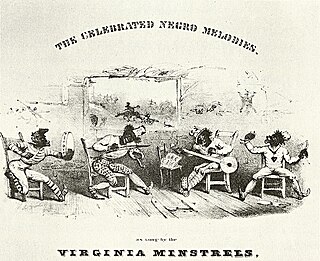
The minstrel show, also called minstrelsy, was an American form of theater developed in the early 19th century. The shows were performed by mostly white actors wearing blackface makeup for the purpose of comically portraying racial stereotypes of African Americans. There were also some African-American performers and black-only minstrel groups that formed and toured. Minstrel shows stereotyped blacks as dimwitted, lazy, buffoonish, cowardly, superstitious, and happy-go-lucky. Each show consisted of comic skits, variety acts, dancing, and music performances that depicted people specifically of African descent.
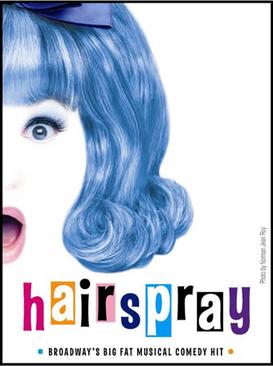
Hairspray is an American musical with music by Marc Shaiman and lyrics by Marc Shaiman and Scott Wittman, with a book by Mark O'Donnell and Thomas Meehan, based on John Waters's 1988 film of the same name. The songs include 1960s-style dance music and "downtown" rhythm and blues. Set in 1962 Baltimore, Maryland, the production follows teenage Tracy Turnblad's dream to dance on The Corny Collins Show, a local TV dance program based on the real-life Buddy Deane Show. When Tracy wins a role on the show, she becomes a celebrity overnight, leading to social change as Tracy campaigns for the show's integration.
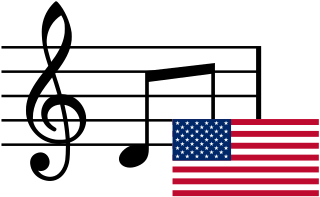
African-American music is a broad term covering a diverse range of musical genres largely developed by African Americans and their culture. Its origins are in musical forms that developed as a result of the enslavement of African Americans prior to the American Civil War. It has been said that "every genre that is born from America has black roots."

Alan Irwin Menken is an American composer, pianist, music director, and record producer, best known for his scores and songs for films produced by Walt Disney Animation Studios. Menken's music for The Little Mermaid (1989), Beauty and the Beast (1991), Aladdin (1992), and Pocahontas (1995) has each won him two Academy Awards. He also composed the scores and songs for Little Shop of Horrors (1986), Newsies (1992), The Hunchback of Notre Dame (1996), Hercules (1997), Home on the Range (2004), Enchanted (2007), Tangled (2010), and Disenchanted (2022), among others. His accolades include winning eight Academy Awards — becoming the second most prolific Oscar winner in the music categories after Alfred Newman, a Tony Award, eleven Grammy Awards, seven Golden Globe Awards, and a Daytime Emmy Award. Menken is one of eighteen people to have won an Emmy, a Grammy, an Oscar and a Tony.
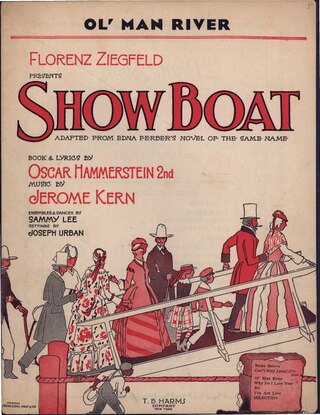
"Ol' Man River" is a show tune from the 1927 musical Show Boat with music by Jerome Kern and lyrics by Oscar Hammerstein II, who wrote the song in 1925. The song contrasts the struggles and hardships of African Americans with the endless, uncaring flow of the Mississippi River. It is sung from the point of view of a black stevedore on a showboat, and is the most famous song from the show. The song is meant to be performed in a slow tempo; it is sung complete once in the musical's lengthy first scene by the stevedore "Joe" who travels with the boat, and, in the stage version, is heard four more times in brief reprises. Joe serves as a sort of musical one-man Greek chorus, and the song, when reprised, comments on the action, as if saying, "This has happened, but the river keeps rolling on anyway."

Tevin Jermod Campbell is an American singer and songwriter. He performed gospel in his local church from an early age. Following an audition for jazz musician Bobbi Humphrey in 1988, Campbell was signed to Warner Bros. Records. In 1989, Campbell collaborated with Quincy Jones performing lead vocals for "Tomorrow" on Jones' album Back on the Block and released his Platinum-selling debut album, T.E.V.I.N. The album included his highest-charting single to date, "Tell Me What You Want Me to Do", peaking at number 6 on the Billboard Hot 100. The debut album also included the singles "Alone With You", and "Goodbye".
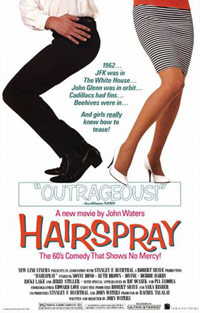
Hairspray is a 1988 American comedy film written and directed by John Waters, starring Ricki Lake, Divine, Debbie Harry, Sonny Bono, Jerry Stiller, Leslie Ann Powers, Colleen Fitzpatrick, Michael St. Gerard, and Ruth Brown. Hairspray was a dramatic departure from Waters's earlier works, with a much broader intended audience. Hairspray's PG is the least restrictive rating a Waters film has received; most of his previous films were rated X by the MPAA. Set in 1962 Baltimore, Maryland, the film revolves around self-proclaimed "pleasantly plump" teenager Tracy Turnblad as she pursues stardom as a dancer on a local TV show and rallies against racial segregation.

"Live to Tell" is a song by American singer Madonna from her third studio album, True Blue (1986). The song was originally composed by Patrick Leonard as an instrumental for the score of Paramount's film Fire with Fire, but Paramount rejected it. Leonard then presented the track to Madonna, who decided to use it for At Close Range, a film starring her then-husband Sean Penn. Madonna wrote the lyrics, co-composed the melodies and co-produced it with Leonard. "Live to Tell" was released as True Blue's lead single in 1986, by Sire Records; afterwards, it was included on Madonna's compilation albums The Immaculate Collection (1990), Something to Remember (1995), and Celebration (2009). A pop ballad, the song includes instrumentation from guitars, keyboards, drums and a synthesizer, while the lyrics deal with deceit, mistrust and childhood scars; Madonna also recalled in an interview that she thought about her relationship with her parents while writing the lyrics.
Hairspray is a 2007 musical romantic comedy film based on the 2002 Broadway musical of the same name, which in turn was based on John Waters's 1988 comedy film of the same name. Produced by Ingenious Media and Zadan/Meron Productions, and adapted from both Waters's 1988 script and Thomas Meehan and Mark O'Donnell's book for the stage musical by screenwriter Leslie Dixon, the film was directed and choreographed by Adam Shankman and has an ensemble cast including John Travolta, Michelle Pfeiffer, Christopher Walken, Amanda Bynes, James Marsden, Queen Latifah, Brittany Snow, Zac Efron, Elijah Kelley, Allison Janney, and Nikki Blonsky in her feature film debut. Set in 1962 Baltimore, Maryland, the film follows the "pleasantly plump" teenager Tracy Turnblad (Blonsky) as she pursues stardom as a dancer on a local television dance show and rallies against racial segregation.
"Can't Help Lovin' Dat Man" with music by Jerome Kern, and lyrics by Oscar Hammerstein II, is one of the most famous songs from their classic 1927 musical play Show Boat, adapted from Edna Ferber's 1926 novel.
"You Can't Stop The Beat" is the finale number in the 2002 musical Hairspray. It is sung by Tracy, Link, Penny, Seaweed, Edna, Motor Mouth, Velma, and Amber with Corny and Wilbur as backing singers. Although the lyrics touch on sizeism and racism, the song also references broader themes of change and progression. The song pays tribute to the Phil Spector-produced 1966 Ike & Tina Turner hit "River Deep – Mountain High". Members of the Hairspray Live! cast have lovingly mocked the song as "You Can't Stop to Breathe".

Hairspray: Soundtrack to the Motion Picture is the soundtrack album for the 2007 New Line Cinema musical film Hairspray. The film is an adaptation of the 2002 Broadway musical of the same name, itself adapted from John Waters's original 1988 film. It features performances from the film's cast, which includes John Travolta, Michelle Pfeiffer, Christopher Walken, Amanda Bynes, James Marsden, Queen Latifah, Brittany Snow, Zac Efron, Elijah Kelley, and Nikki Blonsky as the lead character of Tracy Turnblad.

Hairspray: Original Broadway Cast Recording is the cast album for the 2002 musical Hairspray. The show is an adaptation of the 1988 film of the same name. It features performances from the show's cast, which includes Harvey Fierstein, Linda Hart, Dick Latessa, Kerry Butler, Clarke Thorell, Mary Bond Davis, Laura Bell Bundy, Matthew Morrison, Corey Reynolds, and Marissa Jaret Winokur as the lead character of Tracy Turnblad. The cast recording earned the 2003 Grammy Award for Best Musical Theater Album.
"Welcome to the 60's" is a song from the 2002 musical Hairspray. it is performed by Tracy Turnblad, Edna Turnblad, Mr. Pinky, and a Greek chorus consisting of three African-American stylists entitled the Dynamites.
"Without Love" is a song from the 2002 musical Hairspray. It is a quartet song performed by Tracy, Link, Penny, and Seaweed, and is inspired by the duets of Motown artists Marvin Gaye & Tammi Terrell.
"Good Morning Baltimore" is the opening number of the 2002 musical Hairspray. Written by Marc Shaiman and Scott Wittman, it is performed by the protagonist, Tracy Turnblad, and alludes to the distinctive beat and vocal effects ("oh-oh-oh") of The Ronettes' 1963 hit "Be My Baby".
"I Know Where I've Been" is a gospel-style, soul song from the 2002 musical Hairspray, performed by "Motormouth" Maybelle as she leads a protest for racial equality through the streets of Baltimore.

"Q.U.E.E.N." is a song by American recording artist Janelle Monáe featuring the singer Erykah Badu. It was released on April 23, 2013, as the lead single from Monáe's second studio album, The Electric Lady. Stylized in the form of question and response, each line of the song has Monáe expressing her thoughts on subjects ranging from sexuality to religion. Prince, a mentor to Monáe, called the music video for "Q.U.E.E.N." the best music video of 2013.
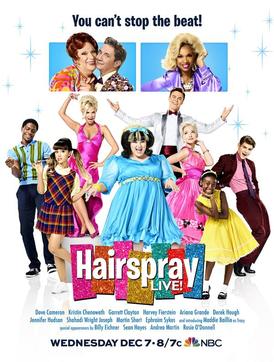
Hairspray Live! is an American television special that aired live on the American television network NBC on December 7, 2016. Produced by Craig Zadan and Neil Meron, and hosted by Darren Criss, it is a performance of a new adaptation of the 2002 Broadway musical Hairspray.

Rest in power is an expression used to mourn, remember or celebrate a deceased person, especially someone who is thought to have struggled against systemic prejudice such as homophobia, transphobia, racism or suffered because of it, particularly in black and LGBTQ communities in the United States. It has been used to eulogize victims of hate crimes while protesting the social inequality and institutionalised discrimination that may have led to their deaths. It is a common phrase to use to honor someone’s legacy, though as an activist.
References
- ↑ Azizi Powell. "TEXT ANALYSIS: "RUN AND TELL THAT" PHRASE IN POPULAR CULTURE". CocoJams. Archived from the original on 2010-10-05.
{{cite web}}: CS1 maint: bot: original URL status unknown (link) - ↑ "Hairspray (Birmingham)".
- ↑ "Hairspray - Songs and Themes". Archived from the original on 2014-07-12. Retrieved 2014-06-30.
- ↑ "Final Analysis of "Hairspray"". 4 December 2009.
- ↑ "Hairspray: 2-Disc Shake & Shimmy Edition - CINEMABLEND". 27 May 2016.
- ↑ "Cheeky, camp and colourful: Hairspray – Review". 21 March 2014.
- ↑ "HAIRSPRAY - Film Journal International".
- ↑ Stevens, Dana (19 July 2007). "Not a Drag" – via Slate.